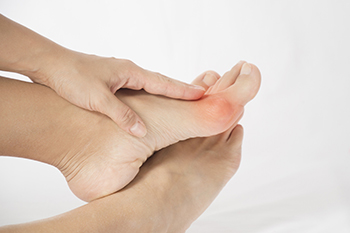
A bunion, or hallux valgus, is a deformity that occurs when a bony bump forms at the base of the big toe pushing it outward. From this movement, the tip of the big toe is pulled toward the smaller toes. Activities, including walking and standing, can lead to stiffness, foot pain, swelling, and redness. Calluses may develop where the big toe and the second toe touch or on the ball of the foot. Ill-fitting shoes, that are narrow or tight, or prolonged standing may lead to bunions or make them worse. Bunions can also be a result of one’s foot shape or an underlying condition, such as arthritis. Smaller bunions, also known as bunionettes, can form on the joint of the smaller toe. Bunions most often happen to elderly people and women. One can try bunion pads, better-fitting shoes, or toe spacers to help reduce the pain of bunions. If these things do not work, one can have bunion surgery, or a bunionectomy. If you have a bunion, it is a good idea to visit a podiatrist who can provide the best treatment options for you.
If you are suffering from bunions, contact Dr. Steven Shlonsky of Louisville, Kentucky. Dr. Shlonsky can provide the care you need to keep you pain-free and on your feet.
What Is a Bunion?
A bunion is formed of swollen tissue or an enlargement of boney growth, usually located at the base joint of the toe that connects to the foot. The swelling occurs due to the bones in the big toe shifting inward, which impacts the other toes of the foot. This causes the area around the base of the big toe to become inflamed and painful.
Why Do Bunions Form?
Genetics – Susceptibility to bunions are often hereditary
Stress on the feet – Poorly fitted and uncomfortable footwear that places stress on feet, such as heels, can worsen existing bunions
How Are Bunions Diagnosed?
Doctors often perform two tests – blood tests and x-rays – when trying to diagnose bunions, especially in the early stages of development. Blood tests help determine if the foot pain is being caused by something else, such as arthritis, while x-rays provide a clear picture of your bone structure to your doctor.
How Are Bunions Treated?
- Refrain from wearing heels or similar shoes that cause discomfort
- Select wider shoes that can provide more comfort and reduce pain
- Anti-inflammatory and pain management drugs
- Orthotics or foot inserts
- Surgery
If you have any questions, please feel free to contact our office located in Louisville, KY . We offer the newest diagnostic and treatment technologies for all your foot care needs.







